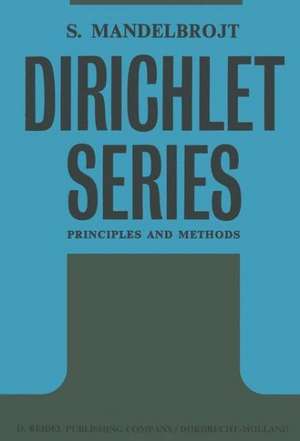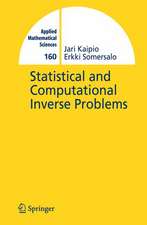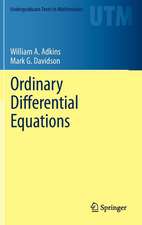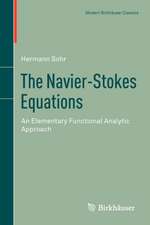Dirichlet Series: Principles and Methods
Autor S. Mandelbrojten Limba Engleză Paperback – 8 noi 2011
Preț: 443.63 lei
Preț vechi: 554.53 lei
-20% Nou
Puncte Express: 665
Preț estimativ în valută:
84.89€ • 88.85$ • 70.65£
84.89€ • 88.85$ • 70.65£
Carte tipărită la comandă
Livrare economică 27 martie-02 aprilie
Preluare comenzi: 021 569.72.76
Specificații
ISBN-13: 9789401031363
ISBN-10: 9401031363
Pagini: 180
Dimensiuni: 152 x 223 x 9 mm
Greutate: 0 kg
Ediția:1972
Editura: SPRINGER NETHERLANDS
Colecția Springer
Locul publicării:Dordrecht, Netherlands
ISBN-10: 9401031363
Pagini: 180
Dimensiuni: 152 x 223 x 9 mm
Greutate: 0 kg
Ediția:1972
Editura: SPRINGER NETHERLANDS
Colecția Springer
Locul publicării:Dordrecht, Netherlands
Public țintă
ResearchDescriere
It
is
not
our
intention
to
present
a
treatise
on
Dirichlet
series.
This
part
of
harmonic
analysis
is
so
vast,
so
rich
in
publications
and
in
'theorems'
that
it
appears
to
us
inconceivable
and,
to
our
mind,
void
of
interest
to
assemble
anything
but
a
restricted
(but
relatively
complete)
branch
of
the
theory.
We
have
not
tried
to
give
an
account
of
the
very
important
results
of
G.
P6lya
which
link
his
notion
of
maximum
density
to
the
analytic
continuation
of
the
series,
nor
the
researches
to
which
the
names
of
A.
Ostrowski
and
V.
Bernstein
are
intimately
attached.
The
excellent
book
of
the
latter,
which
was
published
in
the
Collection
Borel
more
than
thirty
years
ago,
gives
an
account
of
them
with
all
the
clarity
one
can
wish
for.
Nevertheless,
some
scattered
results
proved
by
these
authors
have
found
their
place
among
the
relevant
results,
partly
by
their
statements,
partly
as
a
working
tool.
We
have
adopted
a
more
personal
point
of
view,
in
explaining
the
methods
and
the
principles
(as
the
title
of
the
book
indicates)
that
originate
in
our
research
work
and
provide
a
collection
of
results
which
we
develop
here;
we
have
also
included
others,
due
to
present-day
authors,
which
enable
us
to
form
a
coherent
whole.
Cuprins
I/Sequences
of
Exponents
and
Associated
Sequences.
Elementary
Theorems
on
the
Coefficients
and
on
Convergence.-
I.1.
Ascending
Sequences
of
Positive
Numbers.-
I.2.
General
Properties
of
Convergence.-
I.3.
The
Calculus
of
Coefficients
and
Some
Important
Combinations
of
Coefficients.-
II/Inequalities
Concerning
the
Coefficients.-
II.
1.
Inequalities
Corresponding
to
the
Arithmetic
Character
of
the
Exponents.-
II.2.
A
General
Inequality
for
the
Coefficients
Corresponding
to
Finite
Upper
Density
of
the
Exponents.-
III/Theorems
of
Liouville-Weierstrass-Picard
Type
of
Arithmetical
Character
and
of
General
Character.-
III.
1.
Theorems
of
Arithmetical
Type.-
III.
2.
Liouville-Picard
Theorems
of
General
Type.-
IV/Singularities
of
Functions
Represented
by
a
Taylor
Series.-
IV.
1.
Singularities
of
Taylor
Series.-
V/Composition
of
Singularities.-
V.l.
Composition
of
Hadamard
Type
and
Generalizations.-
V.2.
Composition
of
Functions
of
Slow
Growth.-
V.3.
‘Fictitious
Composition’
of
Singularities.-
V.4.
Composition
of
Functions
of
Rapid
Growth.-
V.5.
Composition
of
‘Hurwitz
Type’.-
VI/Some
Applications
of
the
Principles
for
Analytic
Continuation.-
VI.1.
Arithmetic
Properties
of
the
Exponents
and
the
Analytic
Continuation.-
VI.2.
Analytic
Continuation
of
General
Dirichlet
Series.-
VI.3.
Entire
Functions
Represented
by
Dirichlet
Series.-
VI.4.
Some
Applications
of
the
Composition
Theorems.-
VII/On
the
Behaviour
of
the
Remainders
of
a
Dirichlet
Series
in
the
Domain
of
Existence
of
the
Function.
Applications.-
VII.1.
Evaluation
of
the
Remainders
of
(A,
?).-
VII.2.
Applications
of
the
Results
of
Chapter
III
and
of
VI.
to
Series
Meromorphic
on
an
Interval
of
the
Axis
of
Convergence
124.-
VIII/Applications
to
the
Generalized
Rie-Mann
Functional
Equation.-
VIII.1.
Number
of
Independent
Solutions.
Links
between
Exponents.-
IX/Influence
of
Arithmetical
Properties
of
the
Exponents
of
a
Dirichlet
Series
on
its
Analytic
Continuation.-
IX.1.
Isolated
Fractional
Parts
of
the
Exponents
and
the
Possibility
of
Analytic
Continuation.-
IX.2.
Relations
Between
Isolation
of
the
Fractional
Parts
of
the
Exponents
and
the
Distribution
of
Singularities.-
IX.3.
Variation
of
the
Exponents
and
the
Analytic
Continuation.-
X/Bibliographical
Notes.-
Note.















